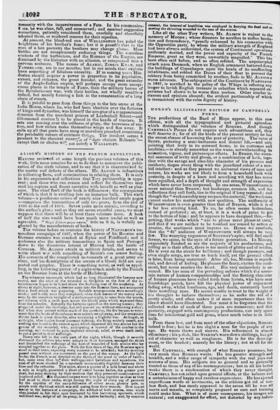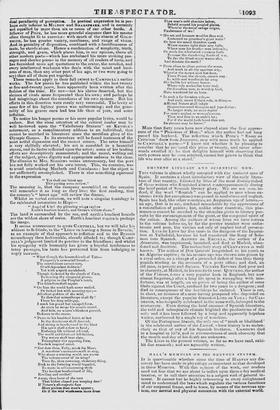MOXON'S ILLUSTRATED EDITION OF CAMPBELL'S POEMS.
THE productions of the Bard of Hope appear, in this new edition, with all the typographical and pictorial splendour which distinguished the volumes of ROGERS. And though CAMPBELL'S Poems do not require such adventitious aid, they well deserve it; for of all the bards of the present century he has the surest chance of becoming the poet of posterity. The verse of Scorr, picturing a semi-barbarous and district life,—and only painting that truly in its outward forms, in its costumes and localities,—is already somewhat on the wane, notwithstanding its animation, vigour, and picturesque effects. In BYRON, the essen- tial sameness of levity and gloom, or a combination of both, toge- ther with the savage and clan-like character of his persons and incidents, tinges every thing with the jaundiced colour of a mor- bid intellect : and as they present no universal views of man and nature, his works are not likely to form a household book with posterity, in despite of a keen and searching wit that has never been equalled, and a depth of thought and strength of expression which have never been surpassed. In one sense, WORDSWORTH is more natural than BYRON; but landscape, common life, and the reflections they call forth, tire in the original if long repeated ; and though the "workmanship may surpass the material," the workman cannot endow his matter with new qualities. The uniformity of WORDSWORTH is even greater than that of BYRON, while it is of a far less stirring kind. To us, he often seems bottomless, instead of profound ; or, at least, it is a work of pains to get to the bottom of him : and he appears to have designed this,—for- getting, that works which "are to please must please at once," and that if we are neither to be touched nor roused by action or passion, the sentiment must impress us. Hence we conclude, that the "fit" audience of' Wonnsworern will always be very few. The wearying vagueness of SOUTHRY'S epics, will find small favour, we opine, in the eyes of a future generation. In Morale, exquisitely finished as are the majority of his productions, and telling as is their effect, there is too much of glitter and of artifice. He is ever on the strain for brilliancy ; and though passages, and even single songs, are true as truth itself, yet the general effect is false, from being unnatural. After all, too, Mooeu is superfi- cial, and devoid of feeling. He pleases the fancy, excites the senti- ment, but never reaches the heart. His very melancholy is as- sumed. He has none of the pervading sadness which the uncer- tain nature of human companionships and the fleeting character of human pleasures have called forth from lyrists, who have seen friendships perish, have felt the physical power of enjoyment fading away, whilst loneliness, age, and death, constantly haunt their unwilling eyes. He seems unable to trust to the weight of his thoughts to enforce themselves ; so he seeks the aid of a pretty simile, and often makes it of more importance than the idea it should have illustrated. Nor must it be forgotten that the collected works of each of these poets are numerous; and that posterity, engagedWith contemporary productions, can only spare time for intellectual gold and gems, where much value is in little bulk.
From these last, and from most of the other objections, ROGERS indeed is free ; but be is too slight a man for the people of any age. He wants thews and sinews. His refinement is almost effeminacy ; his plish, like STER'NE'S worn-down shillings, has got rid of character as well as roughness. He is for the drawing- room, or the boudoir; scarcely for the library ; not at all for the world.
But CAMPBELL. with enough of what ROGERS possesses, has very much that ROGERS wants. He has greater strength and breadth, and a wider range of sympathy with the real joys and sorrows of man. His subjects are as general and as generally treated as those of arty of his contemporaries; but in all his better works there is a condensation of which they never thought. CAMPBELL has not relied upon general effects, or the balance and e .unterbalance of happy and careless expressions. He has ejected superfluous words or sentiments, as the athlete:, got rid of use- less flesh, and has rarely appeared in the arena till he was all nerve and muscle, as completely prepared as care and training could make him. What is -of more consequence, his images are natural ; not exaggerated for effect, not distorted by any intim- duel peculiarity of perception. In poetical expression he. is per- haps only inferior to MILTON and SHARAPSARII. and is certainly not equalled by more than six or seven of our other bards. A follower of Pore, be has more graceful elegance than his master often thought lit to exercise: with much of the charm of GOLD- SMITH, he has greater variety, manliness, and range of vision. And in geniality of disposition, combined with a fastidiousness of taste, he stands alone. Hence a combination of simplicity, truth, strength, and grace, which places him, in our opinion, above all other modern poets—which has embalmed his more striking pas- sages and shorter poems in the memory of all readers of taste, and has furnished more apt quotations to the orator, the novelist, and every intellectual workman who deals with the mind and busi- ness of man, than any other poet of his age, or (we were going to say) than all of them put together. These remarks apply in their full extent to CAMPBELL'S earlier works. The few pieces he has published within the last twenty or five-and-twenty years, have apparently been written after the fashion of the time. He saw—not his shrine deserted, but the shrines of rivals more frequented than his own ; and perhaps he had misgivings about the soundness of his own system. But his efforts in this direction were rarely very successful. The levity of some few of his lighter pieces was unbecoming; and the gene- rality of his graver ones had less life than of yore, and sonic inflation.
To notice his longer poems or his more popular lyrics, would be useless. But the close attention of the critical reader may be well bestowed upon the "Valedictory Stanzas" on KEMBLE's retirement, as a complimentary address to an individual, that cannot be matched in literature since the meridian glory of the Olympic Games. In its structure will be found instances of the most artful digression and the easiest return. The actor himself is very skilfully elevated ; his art is ennobled in a beautiful stanza, and its lustre reflected upon the artist; some of his leading efforts are descriptively enumerated; and the moral, welling out of the subject, gives dignity and appropriate sadness to the close. The allusion to Mrs. SionoNs seems unnecessary, but the poet has not fully worked out his own intent. This, we conceive, was to avoid overlooking Macbeth and Coriolanus : but the object is not sufficiently accomplished. There is also something equivocal in the expression
" Yet shall our latest age This parting scene review."
The meaning is, that the company assembled on the occasion will remember it as long as they live: the first reading, that the country's" latest age' will review the dinner.
Whilst on verbal criticism, we will note a singular tautology in the celebrated invocation to Hope- " Angel of Life! thy glittering wings explore
Earth's loneliest bounds, and Ocean's wildest shore."
The land is surrounded by the sea, and earth's loneliest bounds are the wildest shore of ocean. Earth's loneliest wastes is perhaps the image.
It seems unnecessary to quote CAMPBELL, but we will take his address to &Made, in the "Lines on leaving a Scene in Bavaria," as an example of that approach to inflation and to the Byronic misanthropy then fashionable, already alluded to; though Cane- HELL'S judgment limited its practice to the friendless; and whilst his sympathy with humanity has given a hopeful tenderness to many passages, his taste has prevented him from indulging in angry sarcasm. " What though the bosom-friends of Fate— Prosperity's unwearied brood—
Thy consolations cannot rate, 0 self-dependent Solitude!
Yet with a spirit unsubdued,
Though darkened by the clouds of Care,
To worship thy congenial gloom, A pilgrim to the Prophet's tomb, The friendless shall repair.
"On him the world bath never smiled, Or looked hut with accusing eye ;— All-silent goddess of the wild, To thee that misanthrope shall fly ! I hear his deep soliloquy, I mark his proud but ravaged form, AS stern be wraps his mantle round, And bids, on winter's bleakest ground, Defiance to the storm.
"Peace to his banished heart, at last In thy dominion!' shall descend, And strong as beech-wood in the blast His spirit shall refuse to bend; Enduring life without a friend, The world and falsehood left hellion, Thy votary shall bear elate. Triumphant O'er opposing Fate, His dark inspired mind.
"But *lot thou, Folly, mock the Muse, A wanderer's mountain-walk to sing, Who shuns a warring world, nor wont, The vulture-cover of its wing? Then fly, thou cowering. shivering thing, Rack to the fosteriog world beguiled, To waste in self.consuming strife The loveless brotherhood of life, Reviling and reviled !
"Away, thou lover of the race
That hither chased yon weeping deer ! If Nature's all-majestic face
More pitiless than man'. appear' •
Or if the wild windemess more drier Than man's cold charities below', Behold around his peopled plait* Where'er the social savage reigns, Exuberance of wo !
" Ilia art and honours woulrlst thou ssek Embossed on grandeur's giant walls? Or hear his moral thunders speak WLere senates light their airy halls, Whete man his brother man intliralls ;
Or sends his whirlwind warrants forth To rouse the slumbering fiends of war, To dye the blood-warm waves afar,
Awl desolate the earth ?
" From clime to clime pursue the scene, And mark in all thy spacious way,
Where're the tyrant man has been, There Peace, the cherub, cannot stay : In wilds and woudlarals far away She builds her solitary bower. Where only anchorites have trod,
Or friendless men, to worship God, Have wandered for an hour.
" In such a far forsaken vale,—
And such, sweet Damn vale, is thine,— Afflicted Nature shall inhale Heaven-borrowed thoughts and joys divine : Ni. longer wish, no mote repine For man's neglect or woman's scorn. Then wed thee to an exile's lot; For if the world hath loved thee not, Its absence may be borne."
More than forty years have now elapsed since the first appear- ance of the " Pleasures of Hop," when the author had not long passed his boyhood. The reflection which Point's " Essay on Criticism' drew from JOHNSON, my with more truth be applied to CAMPBELL'S poem—" I know not whether it be pleasing to consider that he proluced this piece at twenty, and never after- wards excelled it: he that delights himself with observing that such powers may be soon attained, cannot but grieve to think that life was ever after at a stand."



















































 Previous page
Previous page